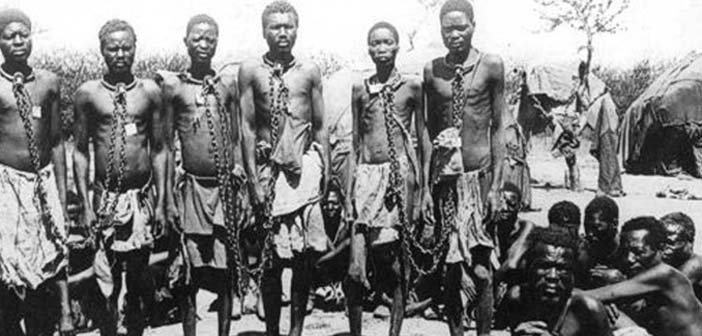Almanya tarihiyle yüzleşmeyi Herero Soykırımı’yla sürdürüyor


Almanya hükümeti, 1904-1908 arasında Alman askerleri tarafından Namibya’da yapılan katliamın soykırım olduğunu kabul etti. Namibya‘da Herero ve Nama halklarına yönelik katliamlar ilk kez Alman hükümetinin resmi bir belgesinde soykırım olarak nitelendi. Hükümetin, Sol Parti milletvekili Niema Movassat'ın soru önergesine verdiği yanıt Frankfurter Rundschau gazetesinde yayınlandı. Almanya hükümeti soru önergesine verdiği cevapta, Namibya’da 1904-1908 yılları arasında kurban sayısının 100 bini aştığı tahmin edilen katliamın soykırım olduğunu kabul etti.
Sol Partili Federal Meclis üyesi Niema Movassat, Almanya ile Namibya temsilcileri arasında halen devam eden gayrıresmi görüşmeler hakkında hükümetten bilgi talep etti. Temmuz başında Namibya’da temaslarda bulunan Almanya Hükümeti Özel Temsilcisi Ruprecht Polenz, görüşmelerin hedefini, "geçmişe dair ortak anlayış temelinde işbirliğinin artırılması" ifadesiyle tanımlamıştı.
Hükümetin açıklamasında, yapılan ikili görüşmelerde tazminat talepleri konusunda nasıl bir pazarlığın yürütüldüğüne somut olarak değinilmediği belirtildi ve Alman-Namibya Gelecek Vakfı üzerinden siyasi eğitim projeleri ve gençlik değişim programları hakkında temasların devam ettiği ifade edildi. Polenz, Frankfurter Allgemeine Zeitung gazetesine verdiği demeçte, görüşmelerde su şebekelerinin geliştirilmesi gibi altyapı hizmetlerinin de gündeme geldiğini açıkladı.
Alman hükümetinin, Ermeni Soykırımı tasarısının ardından Namibya’da yaşananları da soykırım olarak değerlendirmesi konusunu Herero Soykırımı’nı çalışan Hamburg Üniversitesi’nden tarihçi Prof. Jürgen Zimmerer’le konuştuk.
Herero Soykırımı’ndan kısaca bahsedebilir misiniz?
1884’ten beri Almanya’nın Afrika’da (Pasifik’te) sömürgeleri vardı. Kamerun, Togo, Alman Doğu Afrikası ve Alman Güneybatı Afrikası bunlardan en önemlileriydi. 1904’te bugünkü adıyla Namibya olan Alman Güneybatı Afrikası’nda, Herero halkı (sonra da Nama halkı) Alman işgaline, özellikle de hızla artan hak mahrumiyetlerine ve mülksüzleştirmeye karşı direniş göstermeye başladı. Almanya’nın gönderdiği, kötü nam salmış General Lothar von Trotha komutasındaki takviye kuvvet sayesinde yenilginin eşiğinden dönen Almanlar, tarihin ‘beyaz’ ve ‘siyah’ ırklar arasında yaşanacak bir ‘ırk savaşı’ olduğuna inanarak, savaşı buna uygun bir şekilde yönetti. Waterberg’deki çarpışmada yaşanan yenilgiden sonra Herero halkı, kadınlar ve çocuklar da dahil, doğuya doğru, susuz ve kurak Omaheke çölüne kaçtı. Alman birlikleri onları takip ederek daha da ileri kovaladı. General von Trotha’nın emriyle su birikintilerine erişimleri engellendi ve böylece Herero halkı susuzluktan ölmeye mahkûm edildi. Binlerce insanın öldüğü iki aylık bu uygulamanın ardındansa hayatta kalanlar, toplama kamplarına kondu ve zorla çalıştırıldı. Bu kamplardan bazılarında ‘ihmalle yok etme’ uygulaması sürüyordu. Nama halkı savaşa katıldıktan sonra Almanlar kadınları ve çocukları da hedef alan bir yok etme savaşı başlattı. Herero halkının yaklaşık yüzde 70’i, Nama halkınınsa yaklaşık yüzde 50’si yok edildi. Arazilerine el konulup Alman yerleşimcilere satıldı; bu, bugüne kadar devam eden bir haksız kazanç kaynağı.
Resmi bir onay olmasa da Almanya’nın Herero ve Nama halklarına uygulanan soykırımı kabul ettiğini söyleyebilir miyiz?
Henüz parlamentonun resmî bir hareketi olmasa da, gidişat bu yönde. Parlamento sözcüsü Norbert Lammert de dahil olmak üzere, aralarında Yeşiller Partisi Başkanı Cem Özdemir’in de bulunduğu önde gelen isimler bunu destekliyor. Alman hükümeti resmî belgelerde Herero vakası için soykırım terimini kullanmayı reddetmekten vazgeçti; bu artık resmî politika haline geldi. Gelecek yıl parlamentonun resmî olarak tanıması ve başkanın özür dilemesi bekleniyor. Tam olarak hangi kelimenin kullanılacağı, zamanlama ve sonuçlarla ilgili Namibya’yla görüşmeler sürüyor.
Bu kabulün önemi nedir?
Almanya kendini Alman İmparatorluğu’nun (1871-1918) yasal ve ulusal halefi olarak gördüğünden, nihai egemenin, yani parlamento tarafından temsil edilen Alman halkının, tarihî sorumluluğu kabul etmesi önemli. Alman Parlamentosu, 2 Haziran 2016’daki Ermeni Soykırımı tasarısıyla bunu yaptı ve I. Dünya Savaşı sırasındaki Osmanlı’nın esas müttefiki olarak sorumluluğunu kabul etti. Şimdi çifte standart uygulama suçlamasını bertaraf edebilmek için Herero ve Nama halklarıyla ilgili bir tasarı getirmek de kaçınılmaz hale geldi.
Almanya Herero soykırımıyla ilgili olarak bundan sonra nasıl adımlar atabilir?
Şu anda Almanya ve Namibya hükümetleri arasında özrün şekli, kullanılacak kelimeler ve tazminat gibi meselelere dair görüşmeler sürüyor. Alman hükümeti tazminat ödemek gibi yasal yükümlülükleri reddediyor olsa da, gençler için değişim programları ve başka projeler yürütecek bir oluşum yaratıp finanse etme niyetinde.
Almanya, Ermeni Soykırımı tasarısını geçirdikten sonra politik adımlar atmakla suçlandı. Fakat bu son açıklamanın ardından Almanya’nın geçmişiyle gerçekten yüzleştiği söylenebilir mi?
Almanya’nın ‘karanlık’ geçmişiyle, yani Holokost’la ve Nazi Almanyası’nın diğer suçlarıyla yüzleşmek konusunda özel bir performansı var. Özellikle gençleri bu suçlar konusunda bilgilendirmek için bir sürü program var. Merkezi yerlerde, mesela Berlin’de sayısız anıt var ve birçok eski toplama kampı, eğitim programları veriyor. Bu mesele ayrıca okul müfredatında da yer alıyor. Yani geçmişle yüzleşmek için birçok girişim var. Bunlar saklanmıyor, ayan beyan ortada. Şimdi de diğer soykırımları ve insanlığa karşı suçları da bunlara dahil etmek gerekiyor, mesela sömürgecilik döneminde yaşananları… Bu, yine o çirkin yüzünü göstermeye başlayan ırkçılıkla mücadele etmek için de önemli bir adım.
Ermeni Soykırımı’na dair yasanın bu adımın atılmasında nasıl bir rolü oldu?
Ermeni Soykırımı tasarısı, Herero ve Nama soykırımları meselesini yeniden gündeme getirdi. Pek çok insan, Ermeni Soykırımı’ndan on yıl önce yaşanan bu sömürgeci soykırımın da tanınması gerektiğini fark etti. Hatta bu daha önce yapılmalıydı.
Bu adım diğer Avrupa güçlerinin de sömürgeci suçlarını tanımasının yolunu açar mı?
Herero ve Nama soykırımı meselesinin uluslararası olarak bu kadar yakından takip edilmesinin sebebi tam da bu, çünkü bu gelişme eski sömürgeci güçlerin de aynı yoldan gitmesi için baskıları artıracak. Birçok Avrupa ülkesinin yanı sıra ABD, Kanada, Avustralya ve Yeni Zelanda’nın ırkçı sömürgeci geçmişleriyle yüzleşmeleri için tartışmalar var ve baskı giderek artıyor. Şimdiye kadar sömürgeci soykırım uyguladığını kabul etmeye en çok yaklaşan ülke Almanya oldu. Ama yine de süreç hâlâ belirsiz.
Ayrıca mesele sadece soykırımla sınırlı değil, sömürgeciliğin modern dünyayı nasıl şekillendirdiği de önemli. Hamburg, 2014’te ‘Hamburg’un sömürgeci hafızası’nı resmî olarak ele alacağını söyleyerek böyle bir adım atan ilk büyük Avrupa şehri oldu. Bu konuda ortak araştırma projeleri geliştirdi ve bu geçmişi gerektiği gibi anmak için yollar geliştiriyor.
General Lothar von Trotha’nın imha planı
Birleşmiş Milletler belgelerine göre 20. yüzyılın ilk soykırımı 1904-1908 yılları arasında, bugünkü Namibya topraklarında bulunan Alman General Lothar von Trotha’nın emriyle yaşatıldı. İlk kez 1990’da Namibya’nın bağımsızlığını ilan etmesiyle gündeme gelen Herero Soykırımı, aslında sömürgecilik politikalarının bir sonucu. Alman Kolonisi’nin kurduğu kölelik düzenine ayaklanan
Hererolar, Büyük Şef Samuel Maharero önderliğinde, Namalar ise Kral Hendrik Witbooi’nin emriyle silahlanarak isyan edince Alman Merkez Yönetimi, Mayıs 1904’te, olağanüstü yetkilerle donatılan General Lothar von Trotha komutasındaki 14.000 kişilik bir orduyu bölgeye sevk etti.Generalin özel planıyla kıstırlan Hererolar Kalahari Çölü’ne sürüldü ve su kaynaklarına yaklaştırılmadı. 1904-1908 yılları arasında, General’in ölüm tuzaklarından kurtulan Hereroların çoğunluğu da toplama kamplarına kapatıldı ve esir olarak çalışmak zorunda bırakıldı. En asgari insani şartların bile sağlanamadığı kamplarda yaşayan Hereroların birçoğu, fazla çalışma, yetersiz beslenme ve hastalıktan ötürü yaşamını yitirdi. Daha sonra kamplardaki ölüm oranlarının yüzde 69 ile yüzde 74 arasında olduğu anlaşılacaktı. Holokost’taki uygulamaya benzer şekilde, kamplara gönderilenlere önce dövme yapılıyor, kamp dışında çalışmaya gittiklerindeyse kimliklerini belli edecek olan boyun bantları takmaya zorlanıyorlardı. Çalışmayı reddedenler vuruluyor ya da asılıyorlardı.
Nisan 1905’te Generl von Trotha, bu kez bölgede yaşayan bir başka etnik grup olan Namalara karşı bir ölüm politikası başlattı. Namalara da bir mektup göndererek, teslim olmaları yönünde çağrı yapan General, teslim olmayanların vurulacağını ve yok edileceğini söyledi. Katliamlar sonucu, bölgede yaşayan 10 bin Nama öldürülürken, 9 bini de toplama kamplarına kapatıldı.
1933’te Almanya’da iktidarı ele geçiren Nazi rejimi, Münih’teki bir caddeye General von Trotha’nın ismini vermişti. Caddenin ismi, 2006’da Münih Şehir Meclisi’nin kararıyla, savaşın kurbanlarının anısına ‘Herero Caddesi’ olarak değiştirildi.
Bir yıl sonra, soykırıma imza atan General von Trotha’nın ailesi, yerli Herero şeflerinin davetiyle Omaruru’yu ziyaret etti. General’in torunlarından Wolf-Thilo von Trotha’nın “Von Trotha ailesi olarak biz, 100 yıl önce gerçekleşen feci olaylar sebebiyle derin bir utanç içindeyiz. O dönemde, insan hakları büyük ölçüde ihlal edilmiştir” diyerek ailesi adına dedesinin yaptıklarından dolayı Hererolardan özür diledi.



